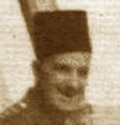Victor Tait
| Victor Tait | |

| |
| Position | Forward/Defense |
| Teams | United Services |
| National team | |
| Born | July 8, 1892, Winnipeg, MB, CAN |
| Died | November 27, 1988, Kensington, England, UK |
| Playing Career | 1927 – 1929 |
Air Vice Marshal Sir Victor Hubert Tait, KBE, CB (July 8, 1892 – November 27, 1988) was a Canadian-born soldier and airman who served with the Royal Canadian Engineers, the Royal Flying Corps, the Royal Air Force, and the Egyptian Air Force. He represented Great Britain in ice hockey in the 1928 Winter Olympics. He was president of the British Ice Hockey Association from 1958 to 1971.
Tait was born in Winnipeg, Manitoba, the son of Samuel Tait, and received a Bachelor of Science degree from the University of Manitoba.
With the outbreak of World War I, Tait joined the Royal Canadian Engineers as a sapper before being commissioned into the London Regiment in 1916. He was seconded to the Royal Flying Corps where he focussed on radio and aerial navigation. Tranferring to the new Royal Air Force in 1918 he was an instructor at the RAF's Electrical and Wireless School in 1919. After a period of illness Tait served on No. 4 Squadron in Constantinople from 1922 to 1924 as a pilot and wireless specialist. On his return to the United Kingdom, Tait was appointed to signals staff officer duties and by 1930 he was back in the Middle East where he continued his work in RAF signals. In 1932 Tait was made the Senior Air Advisor on the British Military Mission in Egypt. At the same time or not long afterwards he was seconded to the Egyptian Air Force which he effectively founded, flying eight aircraft to Cario. The Egyptian monarch, King Fuad, was impressed with Tait and granted him the rank of kaimachan (lieutenant-colonel) and in 1937, King Farouk made him a Commander of the Order of the Nile. In 1937, he was promoted Group Captain.
Returning to the RAF, during World War II, Tait transferred to the RAF's Technical Branch in 1940 and was promoted to Air Commodore. After a spell as Deputy Director of Signals, he was appointed the Director of Radio in 1941, the Director of RDF in 1942 when he was promoted to Air Vice-Marshal. In August 1942 Tait was made Director-General of Signals,[3] a post he until his retirement from the Air Force in 1945. During the preparations for the D-Day landing and the invasion of Normandy, Tait was responsible for planning the attack on German radar stations and spoofing other radar.
After the War he joined the British Overseas Airways Corporation, working as its operations director from 1945 to 1956.
| Preceded by Philip Vassar Hunter CBE |
President of the BIHA 1958–71 |
Succeeded by John F "Bunny" Ahearne |
| This page uses Creative Commons Licensed content from Wikipedia (view authors). |